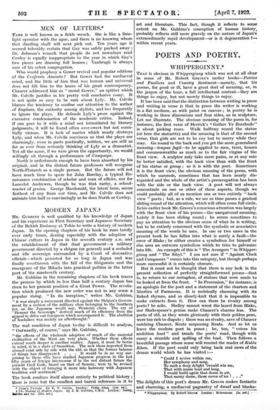MODERN JAPAN.t
Mn. Gummi...Ts is well qualified by his knowledge of Japan and his experience as First Secretary and Japanese Secretary of the British Embassy at Tokio to write a history of modern Japan. In the opening chapters of his book he runs briefly over early times, dealing especially with the adoption of Chinese culture in Japan in the seventh century A.D. and the establishment of that dual government—a military government directed by a shogun (or general) and a secluded and idle sovereign surrounded by a Court of decorative officials—which persisted for so long in Japan and was finally overthrown with the fall of the Shogunate and the emergence of the Mikado into practical politics in the latter part of the nineteenth century.
Mr. Gubbins in the remaining chapters of his book traces the process by which in less than half a century Japan has risen to her present position of a Great Power. The revolu- tion which produced the new order was not in any sense a popular rising. "In its inception," writes Mr. Gubbins,
"it was simply a movement directed against the Shogun's Govern- ment by a section of the military class belonging to the Southern (or, as the Japanese would say, Western) clans. The cry of 'Honour the Sovereign.' derived much of its efficiency from the appeal to drive out foreigners which accompanied it. The abolition of feudalism was mainly an afterthought.'
The real condition of Japan to-day is difficult to analyse. "Outwardly, of course," says Mr. Gubbins, "the effects of the wholesale adoption of much of the material civilization of the West are very plain. Whether these effects extend much deeper is another matter. Japan, it must be borne in mind, is in a state of transition. The new ideas imported from abroad exist side by side with the old, so that the former balance of things has disappeared. . . . It would be in no way sur- prising to those who have studied Japanese progress in the last fifty years of foreign intercourse if in the not distant future the present Civil Code, based on that- of Saxony, were to be revised with the object of bringing it more into harmony with Japanese tradition and sentiment."
The book confines itself almost entirely to political history ; there _is none but the smallest and barest reference in it to • Fames Twilight. By K. N. Colvile. London: Philip Allan. 110s. ed.), t The Making of Modern Japan. By J. B. Gubbine, C.M.U. London: Seeley, Border and Co. [21s. net.] art and literature. This fact, though it reflects to some extent on Mr. Gubbins's conception of human history, probably reflects still more gravely on the nature of Japan's extraordinarily rapid development—or is it degeneration ?— within recent years.










































 Previous page
Previous page